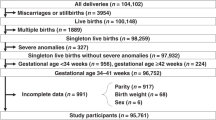Abstract
On the basis of prospectively collected data from 7,525 pregnancies it was examined whether moderate but daily alcohol consumption during pregnancy has consequences for child development during the first 3 years. The women were taken into the study during the first trimester of pregnancy and were seen every 4 weeks. Some 4.7% (353) of the total stated that they drank moderate quantities of alcohol every day; 275 of the 353 pregnant women stopped drinking during the first trimester of pregnancy or for a time, but 78 did not change their drinking habits in general. About 75% of the children were followed up to their 3rd birthday with examinations at birth, 6 weeks, and 9, 18 and 36 months. It was found that in growth and psychomotor development the exposed children did not differ from the the control group. The number of minor and major congenital anomalies was not increased.In general, moderate alcohol consumption during pregnancy does not seem to have any markedly adverse influence on the later development of children. However, an upper limit for apparently safe alcohol consumption cannot be given.
Similar content being viewed by others
References
Bierich, J. R., Majewski, F., Michaelis, R., Tillner, I.: Über das embryo-fetale Alkoholsyndrom. Europ. J. Pediat. 121, 155–177 (1976)
Chernoff, G. F.: The fetal alcohol syndrome in mice: an animal model. Teratology 15, 223–230 (1977)
Deutsche Forschungsgemeinschaft. Schwangerschaftsverlauf und Kindesentwicklung. Boppard: H. Boldt 1977
Hanson, J. W., Jones, K. L., Smith, D. W.: Fetal alcohol syndrome. J. Amer. Med. Ass. 235, 1458–1460 (1976)
Hanson, J. W., Streissguth, A. P., Smith, D. W.: The effects of moderate alcohol consumption during pregnancy on fetal growth and morphogenesis. J. Pediatr. 92, 457–460 (1978)
Jones, K. L., Smith,D. W.,Ulleland, Ch. N., Streissguth, A. P.: Pattern of malformation in offspring of chronic alcohol mothers. Lancet 1973 I, 7815
Kronick, J. B.: Teratogenic effects of ethyl alcohol administered to pregnant mice. Am. J. Obstet. Gynecol. 676–680 (1976)
Little, R. E.: Moderate alcohol use during pregnancy and decreased infant birth weight. Am.J. Public Health 67, 1154–1156 (1977)
Lemoine, P., Harousseau, H., Borteyru, J.-P., Menuet, J.-C.: Les enfants de parents alcoöliques: anomalies observées, à propos de 127 cas. Arch. Franç. Pédiat. 25, 830–831 (1968)
Mau, G., Netter, P.: Kaffee-und Alkoholkonsum — Risikofaktoren in der Schwangerschaft? Geburtsh.u. Frauenheilk.34, 1018–1022 (1974)
Quellette, E. M., Rosett, H. L., Rosman, N. P., Weiner, L.: Adverse effects on offspring of maternal alcohol abuse during pregnancy. New Engl. J. Med. 197, 528–530 (1977)
Van den Berg, B. J.: Epidemiological observations of prematurity: effects of tobacco, coffee and alcohol. In: The epidemiology of prematurity, D. M. Reed, F. J. Stanley (eds.), p. 157. Baltimore-München: Urban and Schwarzenberg 1977
Author information
Authors and Affiliations
Additional information
Dedicated to Prof. Dr. H.-R. Wiedemann on the occasion of his 65 th birthday
Rights and permissions
About this article
Cite this article
Mau, G. Moderate alcohol consumption during pregnancy and child development. Eur J Pediatr 133, 233–237 (1980). https://doi.org/10.1007/BF00496082
Received:
Issue Date:
DOI: https://doi.org/10.1007/BF00496082




